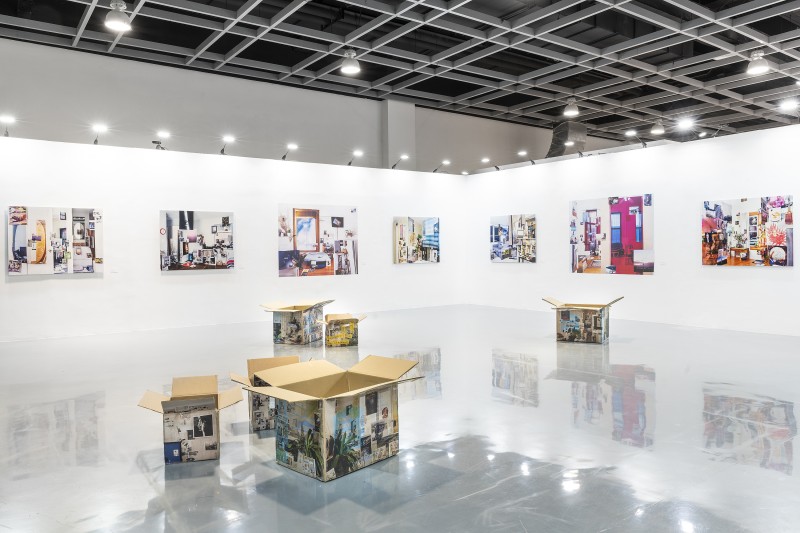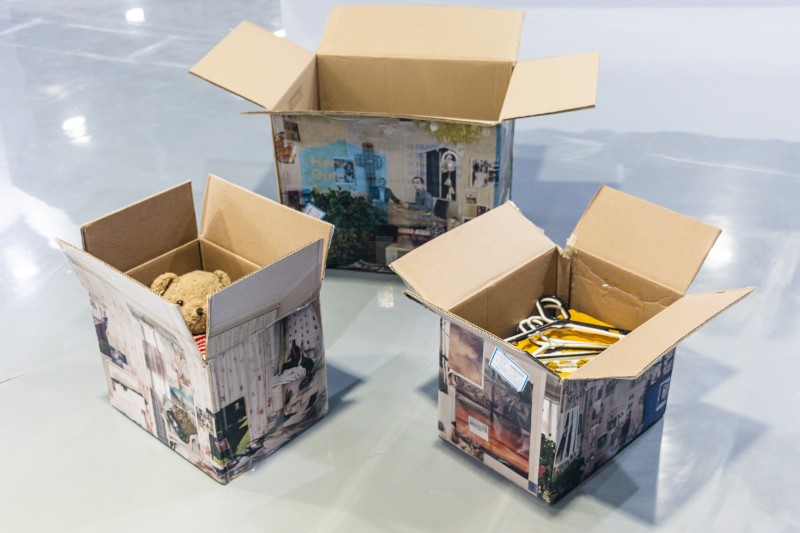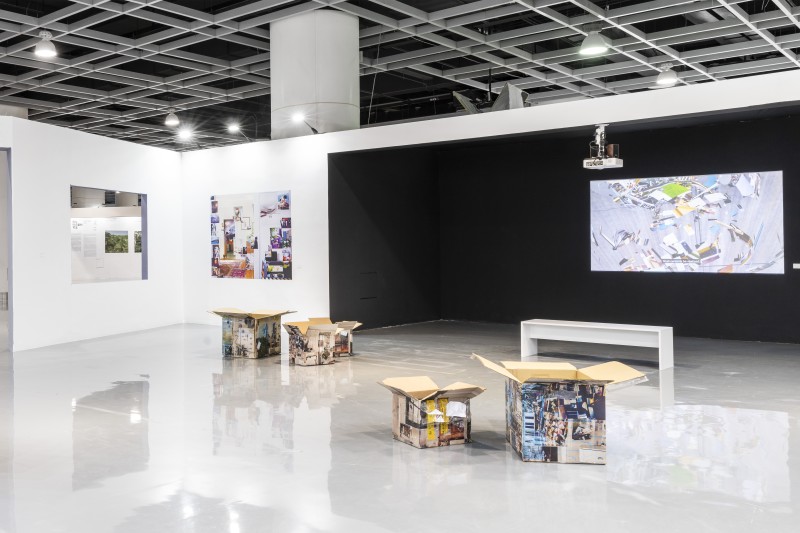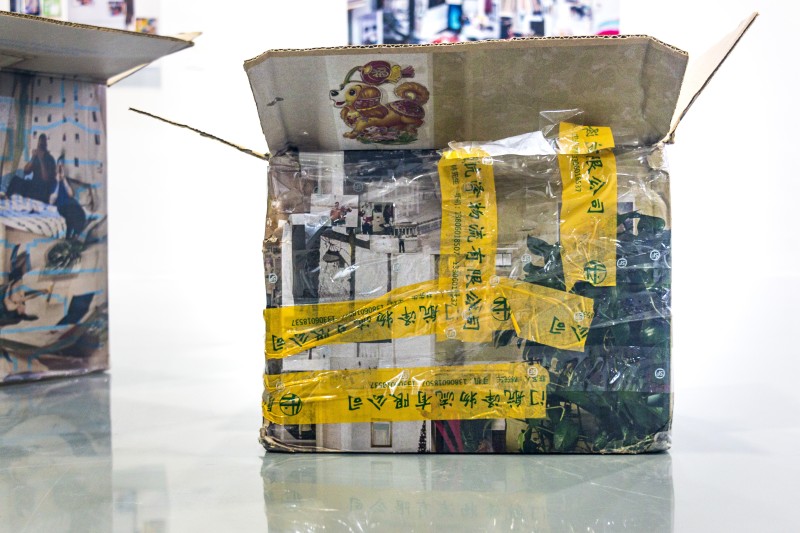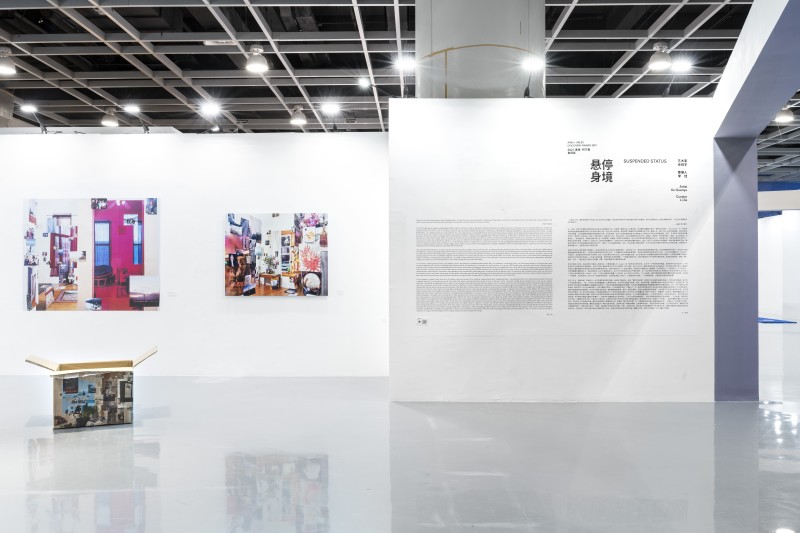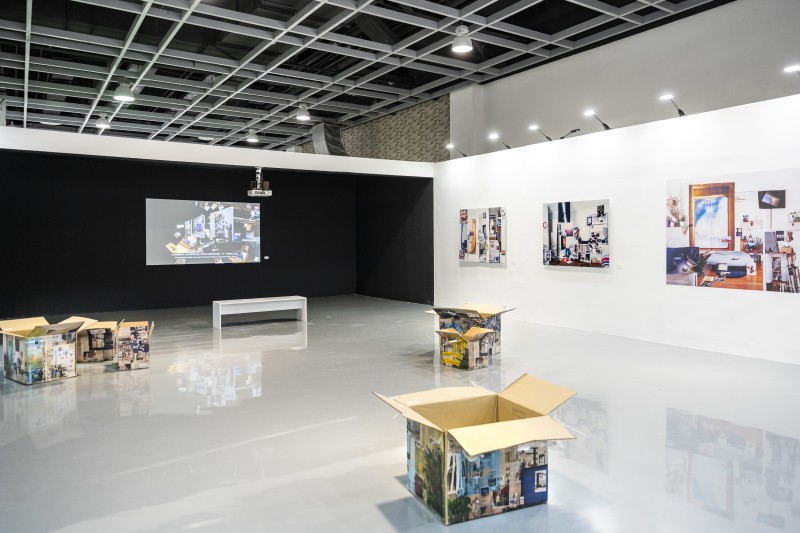Xu Guanyu
Suspended Status
Curated by Li Jia
Basically, therefore, photographers wish to produce states of things that have never existed before; they pursue these states, not out there in the world, since for them the world is only a pretext for the states of things that are to be produced, but amongst the possibilities contained within the camera’s program.
——Vilém Flusser
From the beginning, Xu Guanyu’s photography practice made an impression, with his persistent compulsion and desire to create new spaces and situations. He first received attention for Temporarily Censored Home (2018-2019), in which he briefly occupied his parents’ house in Beijing with pictures he had taken or collected and images from magazines, then recorded the altered space in his own photographs. The crowded, chaotic, and conflicting pictures in the empty rooms in Xu’s photographs, as well as the pictures that are invaded, messed up, or pierced by other pictures, insert countless pictorial channels from different times and places into ordinary household interiors. However, he does not virtually assemble these images using a digital medium. Several times, while no one else was home, he took the pictures and pages that he had developed, printed, or collected, and suspended them in the air, put them up on the walls, or laid them out flat in the living room, the kitchen, his bedroom, and all over the desk. After he had installed the pictures and recorded the scene with his camera, he had to put everything back the way it was, so that when his parents returned home, they would not realize that anything had happened. In this way, Xu combines real-life behaviors, ritualistic performances, intervening actions, and temporary installations with photographs that are simultaneously an act and its result. Perhaps we can understand his work as an experiment in creating new situations. For him, photography implies the production of signs on a symbolic level, but it is also a complex procedures that can leverage images, spaces, bodies, and occurrences. Photography does not simply embodied in certain or materialized states or outcomes; it is more like an open-ended practice that stresses behaviors, processes, and relationships.、
The majority of these temporary occupiers are pictures that Xu Guanyu has taken over the last four years, including landscapes and scenes from China, the United States, and Europe: a detour sign in Philadelphia, an abandoned display window with the American flag in San Francisco, protests in Chicago after Trump was elected, and anti-Brexit posters in Brussels. He also included works of art that he made while he was in the United States, images from his previous series One Land to Another (in which he took photographs with men of different races, social statuses, and ages in their private spaces), pages torn from film and fashion magazines he had collected in his youth, and pictures from his family photo album. In his home, these pictures create a new situation that contradictory yet longs for connection, heterogeneous and wonderful. It is a highly compressed time and space, but it is also a site open to various parallel worlds. His personal experiences, observations, reflections, critiques, and objections are directly presented in these folded, juxtaposed, and confronted images.
For the artist, installing these pictures in his parents’ home is the queering of a heteronormative space. Born in a traditional, conservative family, non-heterosexual behaviors and expressions were not encouraged during Xu Guanyu’s childhood, and his parents still do not know that he is a member of a sexual minority. In his youth, LGBTQ people were repressed, so he turned to Western fashion magazines and TV shows that were dominated by American culture and the white male figure and projected his dreams of freedom onto them. As an adult, due to his experiences as a minority (both in terms of sexual orientation and race) in the United States, the racism, sexism, and anti-LGBTQ sentiment that emerged during the Trump era, and his contemplation of the global political climate, Xu realized that the machinations of nationalism and imperialism were fundamentally intermingled with the patriarchy and the gender binary. The patriarchy and the gender binary connect to and control the individual and the institutional, the personal and the global, and private and public spaces. By temporarily disassembling and reconstructing his parents’ home, Xu created a tolerant, fluid, and non-binary personal and private space and symbolically opened up an imagined utopia, a new world full of differences, comparisons, and contradictions.
Due to pandemic-related travel restrictions, Xu Guanyu cannot be present at his exhibition, appropriately titled “Suspended Status.” He printed pictures from Temporarily Censored Home onto cardboard boxes from an international courier, then used these boxes to send personal items back to China. In this way, “home” continues to bridge binary limitations, but it must also be checked, examined, interrogated, and detained; home is subject to various powers and must even tussle with those powers. Here, Xu Guanyu reveals the myth of individual freedom through its fragile boundaries, while also continuing to create further changes and situations. Whether or not the cardboard boxes bearing these pictures will actually make it to the exhibition site, this “home” has experienced new relationships and new spaces and derived new meanings. In Resident Aliens, another series in this exhibition, Xu uses similar methods to explore the complex circumstances of immigrants in the United States. For immigrants, home may be much like these cardboard boxes; home is never safe and private, and disassembly, damage, or expulsion are ever-present risks. While in the United States, Xu Guanyu found a group of participants with different visa or immigration statuses, and with their permission, he photographed their rooms, then printed these pictures of personal spaces and objects together with the owners’ collections of pictures. He installed these photographs in the owners’ rooms and then took pictures of the room installations. In these photographs and the pictures within these photographs, immigrants who are seeking to or have already become citizens are presented in a fresh, moving way. Their identities and histories, their close relationships and memories, and their living spaces are microcosms of the events (pictures of identity documents and packed cardboard boxes were placed in several of the rooms), political climates, and regional political conditions that immigrants may experience in the United States. These similar cases represent different subjectivities, abilities, times, and spaces that come together and interrogate one another in this temporary and private, yet also public, space. As the “alien” in this home, Xu’s photographs and installation-performances require a process of coordination and discussion with the owner before they create this performative piece together. If in Temporarily Censored Home, the subjects appear as figures or symbols, then Resident Aliens requires the participation and collaboration of different, real subjects. Here, photography becomes a social practice, which also creates a new situation that involves new relationships, spaces of practice, and political potential. For Xu, pictures that become events are more important than pictures that record events. Through juxtaposition, confrontation, conflict, and dialogue between pictures in the space, we can reflect on the sequence of the pictures, question ideologies, reconsider and attempt to leverage existing identities, as well as cultural and political boundaries, while also catching a glimpse of the light coming through the cracks. Xu Guanyu’s practice may help us to believe, once again, that photography can be a weapon of peace, because its power lies in hope.
By Li Jia






